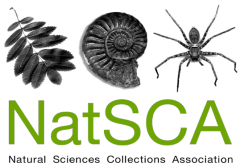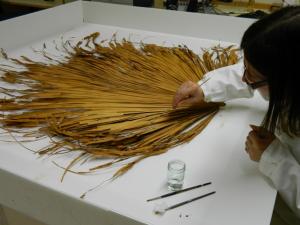Programme
| 9.30 – 10.00 | Registration | |
| 10.00 – 10.10 | Introduction & Housekeeping | |
| 10.10 – 10.25 | Natural History Conservation: Conserving an Endangered Profession. Looking to the future Welcome from NatSCA Conservation Representative Lucie Mascord | |
First Session | ||
| 10.25 – 10.45 | Curation of the Historic England Zooarchaeology Reference Collection: developing strategies for controlling pests and moulds in a large skeletal collection Eva Fairnell, Claire Tsang, Fay Worley, Polydora Baker and Sophie Burgham; Historic England | |
| 10.45 – 11.05 | Storage and conservation of geological collections Kathryn Royce, University College London and Dr Christian Baars, National Museum Wales | |
| 11.05 – 11.25 | Digital conservation: DNA and Diagnostic imaging of entomological collections Lyndall Pereira-da-Conceicoa, National Museums Scotland and Benjamin Price, Natural History Museum London | |
| 11.25 – 11.35 | Questions | |
| 11.35 – 12.00 | Coffee Break and Posters | |
Second Session | ||
| 12.00 – 12.20 | Views on the pathology of petrified forests: a multidisciplinary technological approach Evangelia Kyriazi and Nikolaos Zacharias, University of the Peloponnese | |
| 12.20 – 12.40 | Four 18th century bound herbaria conserved by a botanical conservator: perhaps a different conservation approach and outcome Dr Victoria Purewal, Pure Conservation | |
| 12.40 – 13.00 | A Field Journal to the Conservation of Book and Paper within Natural Science Collections Samuel Suarez Ferreira, Cambridge University Museum of Zoology | |
| 13.00 – 13.10 | Questions | |
| 13.10 – 14.00 | Lunch and Posters | |
Third Session | ||
| 14.00 – 14.20 | Crafting three-dimensional fills for areas of loss on taxidermy: an examination of the needle-felting process and its use in conservation Natalie Jones Cambridge University Museum of Zoology | |
| 14.20 – 14.40 | Experiments in textured taxidermy fills using Japanese tissues Erica Read | |
| 14.40 – 15.00 | Blaschka Models: Four Worrying W’s Paolo Viscardi, National Museum of Ireland and Emmanuel Reynaud, University College Dublin | |
| 15.00 – 15.10 | Questions | |
| 15.10 – 15.35 | Coffee Break and Posters | |
Fourth Session | ||
| 15.35 – 15.55 | The conservation and restoration of an extinct giant amphibian Eryops megacephalus at the University Museum of Zoology Cambridge Beth Hamilton Cambridge University Museum of Zoology | |
| 15.55 – 16.15 | Bringing taxidermy back to life: an examination of the methodology and techniques used in the conservation of an Aldabra giant tortoise Anastasia van Gaver, Cambridge University Museum of Zoology | |
| 16.15 – 16.25 | Questions | |
Lightning Session | ||
| 16.30 – 16.35 | Conservation in the redevelopment of The University of Bergen’s Natural History Museum Signe Bonnichsen, Ruth Murgatroyd, Christina Holmefjord. University Museum of Bergen | |
| 16.35 – 16.40 | Digital surrogates: reducing unproductive physical access - and consequent damage – to collections Dr Mike Howe, National Geological Repository, British Geological Survey | |
| 16.40 – 16.45 | Skin deep: the use of cyclomethicones in the conservation of taxidermy Lu Allington-Jones, Natural History Museum London | |
| 16.45 – 16.50 | SWANS - Cascading expertise Roz Bonnet and Helena Jaeschke, South West Museum Development | |
| 16.50 – 16.55 | Conservation, moulding, casting, photogrammetry, 3D printing, blacksmithing, welding and heaps of horse manure: essential ingredients to successfully display a recently deceased fin whale skeleton Nigel Larkin, Natural History Conservation and Simon Jackson, Tullie House Museum | |
| 16.55 – 17.05 | Questions | |
| 17.05 – 17.15 | Summary and Thanks | |
Registration is now open. Book your tickets via Eventbrite. If your institution is unable to pay this way or you would rather pay by cheque please download the paper booking form. Special arrangements can be made if you are struggling with payment from abroad - please contact treasurer@natsca.org
Tickets are £55 members / £75 non-members
Members: please contact membership@natsca.org to claim your discount code. Institutional Members can claim discount for two of their volunteers or staff to attend. Not a member? Not to worry, you can still save money on tickets by becoming a member. Annual membership: students & unwaged £15, personal £20, institutional £40. Insert your code into the promotional code box before selecting tickets.
Refunds: Please email treasurer@natsca.org for refund enquiries (don't use Eventbrite's refund system)
Please be advised that this event will be filmed on behalf of NatSCA and footage may be used by the organisation for educational and promotional purposes. Attendees may appear in background shots. If you do not want to appear on footage, please advise the organising group at the registration desk on the day.
Bursaries: NatSCA would like to offer 2 bursaries for members towards the cost of the Caring for Natural Science Collections one-day conference. Two bursaries of up to £150 each are available. To apply please complete the form (click here) and return to bursaries@natsca.org. Details of the conditions are in the form. Deadline for application is Friday 31st August 2018.
#NatSCAConservation


